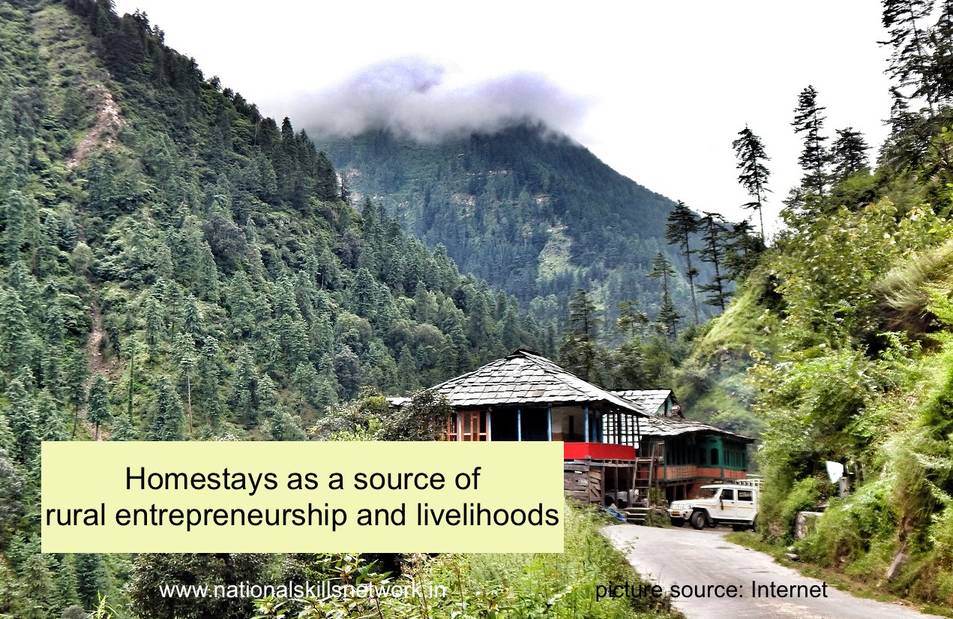In the times when more and more travellers are looking for affordable and pocket-friendly accommodations, homestays provide the best alternative accommodations. In fact, many travellers and tourists across India and globe are interested in staying in rural homestays in remote location. But the question is, how well-equipped are we as a country in capturing this potential sector?
Homestays in India have become popular not just for being affordable but travellers and tourists also see these as a safer option than that of a hotel. By staying in a homestay, students get to network more, travellers get to know more about the culture of the area, and tourists get to see some offbeat places. But what would attract these people to stay in these places and come back once again to experience the authenticity of the place?
Linking rural entrepreneurs with the hospitality sector
While the government is ambitious about adding 46 billion jobs in Hospitality and Tourism sector by 2025, it requires trained and professional workforce in this industry to capture and fuel this growth in the sector. Rural people must be shown this alternative livelihood opportunity right in their village. In fact, just at their homes. They would not need any new infrastructure to become rural entrepreneurs. By sharing a room or two of their houses, and by providing home-cooked food, rural population can be entrepreneurs in no time. This would address the major issue of rural migration in the country.
 No matter where we come from, good food and hygiene would be one of our top priorities. When we visit a new place, a homestay especially, we would sometimes be concerned about the way the food is prepared, the way the room is maintained. To attract more crowd towards the homestays, the ones running or managing these must be trained in hospitality, to maintain hygiene standards and more importantly to market it. And there are certain training institutes to offer all of these.
No matter where we come from, good food and hygiene would be one of our top priorities. When we visit a new place, a homestay especially, we would sometimes be concerned about the way the food is prepared, the way the room is maintained. To attract more crowd towards the homestays, the ones running or managing these must be trained in hospitality, to maintain hygiene standards and more importantly to market it. And there are certain training institutes to offer all of these.
Only when the homestays are marketed well and appears on social media posts and related websites, people would really know and trust the homestay. The rural population must be guided and trained with the technological and social media linkages. This would help them in finding place in the online market, where there are millions out there searching and researching about homestays. Also, to address to the needs of both Indian and international tourists and travellers, homestay owners must also be trained in customer relationship and customer service. This adds a feather in the cap of the villagers, who would pull more crowd to his/her homestay.
On the similar lines, Tourism and Hospitality Sector Skill Council has standardised courses, with Qualification Packs (QPs) for housekeeping, food safety, food serving, guest house assistant, caretaker, guest relations, laundry, room attendant and many more. These certifications and QPs help improve customer service. As customers get a sense of comfort transacting with certified people, the QPs also help in improving the standard of homestays which in turn enables an alternative livelihood for rural people.
Related article: Skills and Jobs: Job Roles in Tourism and Hospitality Industry – Read more: https://nationalskillsnetwork.in/skills-and-jobs-tourism-hospitality/
Promoting rural entrepreneurship through homestays
Homestay is a recent concept in India, and there is a necessity to scale it up since it provides a sustainable option for rural entrepreneurship. To achieve this goal, individual homestay owners/managers can form a cluster to attract and promote an alternative affordable living to the travellers. Together as a cluster, it would be easier for them to market their service and raise necessary funds for improving it. This funding can be through banks, corporates, educational institutions etc. As tourism and hospitality is seen as a potential sector for growth, and homestays are one such attractive option, corporates can be roped-in to fund these as part of their CSR activities. Their employees can be encouraged to stay in these homestays when sent on field.
Also, India is reviving to be the education hub of the world as it was earlier, the educational institutions can recognise and fund certain homestays for their out-station students, which would reduce the expenditure of running hostels and also help in providing alternative livelihood for the rural crowd. This way of recognising homestays by educational institutions has been a common practice in some of the countries in the world and was proven to be affordable and safer for both the students and the institutes.
This idea of scaling up the homestays will help in uplifting the rural population by addressing rural migration and enabling alternative rural livelihood. This will also lead to higher income generation among the rural people and eventually help in bringing them out of the continuous cycle of poverty. It would ultimately help in promoting rural entrepreneurship.













Comments 1